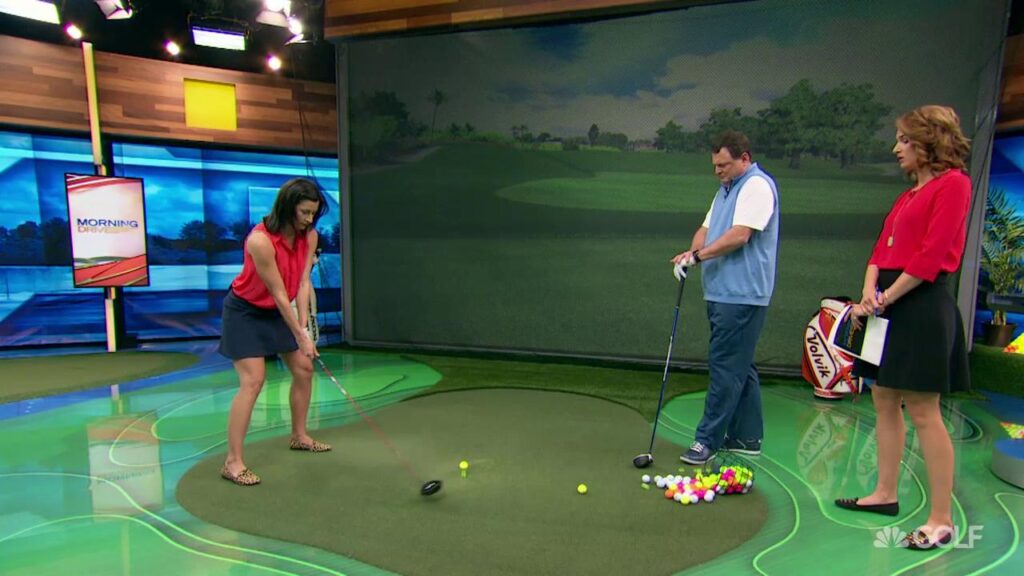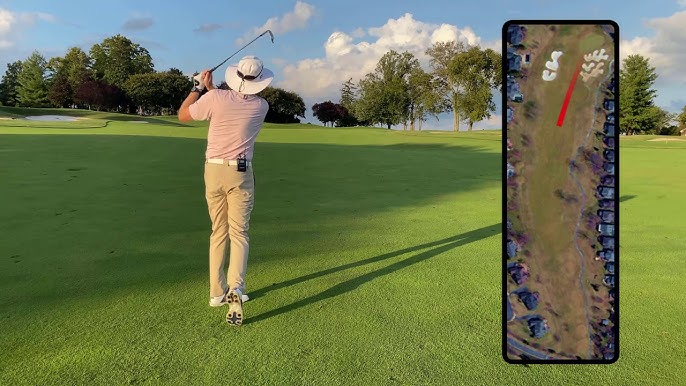Picture this: you step up to the tee, the anticipation building with every beat of your heart. But as you gaze out onto the fairway, you’re faced with a daunting challenge – a blind tee shot. With no clear line of sight, it’s difficult to map out your strategy. Should you play it safe and aim for the middle? Or take a risk and try to conquer the unseen? In this article, we’ll explore the ins and outs of navigating a blind tee shot, giving you the tools you need to confidently tackle this exhilarating but sometimes nerve-wracking challenge.
Choosing the Right Club
When it comes to choosing the right club for your tee shot, there are a few factors you need to consider. First and foremost, take into account the distance to the blind spot. Is it a short distance or a long one? This will determine whether you need to use a wood, a long iron, or a hybrid club. It’s important to choose a club that will allow you to clear the blind spot and reach the fairway comfortably.
Another factor to take into account is the wind conditions. Is the wind blowing towards you or against you? Is it a crosswind? These factors will affect the flight of your ball, so it’s crucial to choose a club that will allow you to compensate for the wind and still hit the ball in the desired direction.
Lastly, factor in the elevation changes on the hole. Is the hole uphill or downhill? Is there a significant change in elevation between the tee box and the fairway? Elevation changes can affect the distance your ball travels, so it’s important to choose a club that will allow you to adjust for these changes and still hit the ball with the desired amount of power.
Understanding the Layout of the Hole
Before you step up to the tee, it’s important to take the time to understand the layout of the hole. Study the course map and the hole description provided by the course. This will give you a clear idea of the hole’s length, any doglegs, or any other unique features that may come into play. Understanding the layout of the hole will help you strategize and plan your shots more effectively.
Pay attention to any hazards or obstacles that may be present on the hole. Are there bunkers, water hazards, or out-of-bounds areas you need to avoid? Identifying these hazards will help you determine the best line to take off the tee and avoid any potential trouble.
In addition to hazards, it’s important to identify potential landing areas on the fairway. Are there any wide-open areas where you can aim your tee shot? Taking note of these landing areas will help you visualize your tee shot and give you a clear target to aim for.

Shot Placement and Alignment
When it comes to shot placement and alignment, there are a few key things to keep in mind. First and foremost, aim for the wider side of the fairway. By aiming towards the wider side, you give yourself a larger margin for error and increase your chances of hitting the fairway. This may mean adjusting your aim slightly to the left or right depending on the hole’s layout.
Consider the ideal angle of approach to the green. Depending on the pin placement and any hazards surrounding the green, it may be beneficial to aim for a specific side of the fairway to set up a better angle for your approach shot. By strategically placing your tee shot, you can open up the green and increase your chances of hitting a closer approach shot.
Lastly, it’s important to focus on hitting the ball straight and avoiding slices or hooks. By maintaining proper alignment and swing mechanics, you can ensure that your ball flies straight towards your intended target. This will help you avoid trouble off the tee and give you a better chance of hitting the fairway consistently.
Visualize the Shot
Visualization is a powerful tool in golf, and it’s especially important when it comes to blind tee shots. Before you step up to the tee, take a moment to create a mental image of the ideal shot. Imagine the ball soaring through the air and landing in the perfect spot on the fairway.
Visualize the path and trajectory of the ball in your mind’s eye. See the ball flying over any obstacles or hazards and landing safely in the desired landing area. By visualizing the shot beforehand, you can enhance your focus and increase your chances of executing the shot successfully.
In addition to visualizing the shot itself, imagine the desired outcome. Picture yourself hitting a perfect tee shot and setting up a great position for your next shot. By envisioning success, you can boost your confidence and approach the tee shot with a positive mindset.

Utilize Course Knowledge
One of the most valuable resources at your disposal when playing a blind tee shot is your own past experience and knowledge of the course. If you’ve played the course before, think back to similar situations and how you approached them successfully.
Consider seeking advice from locals or experienced players who have played the course before. They may be able to provide valuable insights or tips on how to navigate blind tee shots effectively. Don’t hesitate to ask for advice or guidance from those who have more experience on the course.
Take note of any strategic shortcuts or alternative routes that may be available on the hole. Sometimes, taking a different line off the tee or aiming for a specific spot on the fairway can give you a significant advantage. By utilizing your course knowledge, you can make informed decisions and increase your chances of success.
Trust Your Swing
When faced with a blind tee shot, it’s important to trust your swing and stick to your regular pre-shot routine. Take a few practice swings to loosen up and get a feel for the shot. Maintain confidence in your abilities and believe in your swing mechanics.
While it’s natural to feel some nerves or doubts before a blind tee shot, it’s important to stay focused and execute a smooth and controlled swing. Focus on the fundamentals of your swing and trust that your practice and preparation will pay off. By trusting your swing and staying committed to your routine, you can increase your chances of hitting a successful tee shot.

Practice Techniques
To improve your performance on blind tee shots, it’s essential to incorporate specific practice techniques into your training regimen. One effective technique is to practice blind shots on the driving range or using a golf simulator. By hitting shots without being able to see the target, you can develop your feel and distance control, which is key to navigating blind tee shots effectively.
Another important aspect of practice is developing a consistent swing and ball flight. Work on maintaining a repeatable swing tempo and rhythm, as well as a consistent ball flight. By honing in on these areas, you can improve your accuracy and increase your chances of hitting the fairway consistently.
Finally, focus on improving your accuracy and distance control. Pay attention to your ball striking and how your shots vary in terms of distance and accuracy. By focusing on these areas during practice sessions, you can refine your skills and become more confident in your ability to hit a successful blind tee shot.
Adjustment for Different Conditions
Golf is a game that requires adaptability, and this is especially true when it comes to blind tee shots. You need to be able to adjust your approach based on the varying conditions you may encounter. One such condition is the weather. Whether it’s a strong wind, rain, or a hot and humid day, different weather conditions can significantly impact your tee shot.
When faced with varying weather conditions, it’s important to adapt your club selection and swing accordingly. For example, if there’s a strong headwind, you may need to use a more powerful club to compensate for the wind and ensure your ball reaches the desired distance. On the other hand, if there’s a tailwind, you may need to club down to avoid overshooting your target.
Another factor to consider is the influence of different types of grass or terrain. Some courses may have different types of grass on the fairways or rough, which can affect how your ball rolls or sits. Additionally, the terrain itself may have slopes or undulations that can impact the trajectory and direction of your tee shot. By being aware of these conditions, you can make the necessary adjustments and improve your chances of hitting a successful blind tee shot.

Course Management
Course management plays a crucial role in navigating blind tee shots effectively. It’s important to plan your shots strategically to minimize risks and increase your chances of hitting the fairway.
Consider playing it safe and aiming for a conservative target. By focusing on hitting the fairway rather than trying to bomb it down the middle, you can avoid potential trouble and set up a better position for your next shot. Sometimes, playing a more conservative tee shot is the smartest decision, especially if the hole presents significant risks or hazards.
Furthermore, take into account the overall course strategy and your current score. If you’re playing in a competitive setting or trying to post a good score, it may be wise to adjust your strategy on blind tee shots to ensure you’re making the most sensible decisions. This may involve taking a different line off the tee or clubbing down to avoid any unnecessary risks.
By effectively managing the course and making strategic decisions, you can optimize your chances of success on blind tee shots and set yourself up for a strong round.
Mental Preparation and Confidence
No matter how well you’ve prepared or how technically sound your swing is, golf is a mental game. When it comes to blind tee shots, maintaining a positive mindset and belief in your abilities is crucial.
It’s important to approach each tee shot with confidence. Remind yourself of your past successes and focus on the progress you’ve made in your game. Take deep breaths and control your emotions to stay calm and composed. By maintaining a positive mindset, you can approach the shot with clarity and make better decisions.
Additionally, stay focused on the present moment and avoid overthinking. Instead of worrying about the potential hazards or the outcome of the shot, focus on the process and executing a good swing. By staying in the moment and trusting your abilities, you can increase your chances of hitting a successful blind tee shot.
In conclusion, navigating blind tee shots requires a combination of strategic thinking, technical skills, and mental preparation. By considering the distance to the blind spot, understanding the layout of the hole, visualizing the shot, utilizing course knowledge, trusting your swing, practicing specific techniques, adjusting for different conditions, managing the course strategically, and maintaining a positive mindset, you can enhance your chances of hitting successful tee shots on blind holes. So, the next time you encounter a blind tee shot, remember these tips and approach it with confidence. Good luck!







